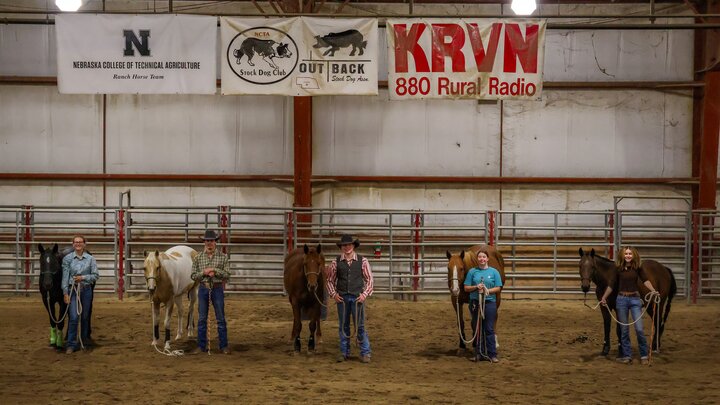CURTIS, Neb. (October 2025) — The final project for students in the eight-week “Introduction to Horseman” course at the Nebraska College of Technical Agriculture offered a true demonstration of communication between horse and handler. Under the direction of Associate Professor Joanna Hergenreder, students presented to the campus community, showcasing lessons learned about horse behavior and training through practical demonstrations.
Throughout the semester, students explored how horses think, react, and learn. The class focused on understanding equine instincts, sensory perception, and body language to help handlers communicate effectively and build trust. “Horses are prey animals that rely on flight for safety,” explained Hergenreder. “Our goal is to help students recognize how horses perceive the world and how to apply that knowledge in training and daily handling.”
Students practiced the “Seven Games,” a progressive series of exercises designed to strengthen connection, respect, and control between horse and handler. These included the Friendly, Porcupine, and Driving Games to build trust and responsiveness, followed by advanced activities such as the Yo-Yo, Circling, Sideways, and Squeeze Games that challenge both horse and human to work in rhythm.
Hergenreder emphasized that these exercises are not tricks, but tools that reflect the psychology of the horse. Each activity uses pressure and releases or small signals that teach the horse to think and respond calmly rather than react with fear. “The horse learns from the release of pressure,” she said. “That moment of relief is the reward that builds confidence and understanding.”
For many students, the experience went beyond classroom instruction. McKenzie Heil, first year student from North Platte, NE shared, “The thing we improved the most was freeing up his movement. I was proud the first time he committed to jumping the barrels in the squeeze game instead of stepping on them. My advice to future students would be to show up to class, ask questions, and push yourself and your horse to become better.”
Karah Barnes, Lincoln NE, reflected on her personal growth and her horse’s transformation. “I have improved the most in my comfortability as my colt’s guide,” she said. “Jo places a priority on understanding the horse’s mind, and that has bolstered my confidence. My horse, Django, went from being distracted and impatient to one that focuses on me and understands his job.”
Her proudest moment came during the final presentation. “We had struggled with the Circling Game, but after staying consistent and patient, Django finally understood what I was asking. That was a huge breakthrough for both of us.”
Madison Wilson from Shattuck, OK, also described her success in the Circling Game. “That was where we improved the most,” she said. “I was especially proud when he jumped the barrel on the first try without a huge argument. My advice to next semester’s beginning horseman students is to not give up on your horse and not be afraid to show them who’s boss.”
August Schow from Paxton, NE, shared that both he and his horse made important progress through the semester. “Teaching my horse that she could be safe on her own and not just in my lap was one of the biggest improvements,” he said. “For me, it was fine tuning my cues.” He added that her proudest moment came when they reached the seventh game. “We worked long and hard to get through all of them, and she did a great job her first time with the squeeze game.” His advice for future students was simple: “Be patient, be open minded, and listen to and respect your instructor.”
Gage Sorenson, from Garden City, KS, noted that the course helped both him and his horse grow in confidence and control. “One thing my horse improved on the most was stopping and thinking before reacting,” he said. “She used to just want to go, but now she’s learning to think first.” He shared that his proudest moment came when his horse finally loaded calmly into a narrow trailer after weeks of practice. “I worked and worked with her outside of class, and one day she just walked right in like it was nothing,” he said. His advice for new students was straightforward: “Do not come into the class thinking you already know it all and your way is the only way. It makes it hard to learn and hard to be around.”
As the semester concluded, Hergenreder praised her students for their progress and dedication. “Horsemanship is not about control,” she said. “It is about communication, trust, and timing. When those come together, both the horse and the handler grow.”




